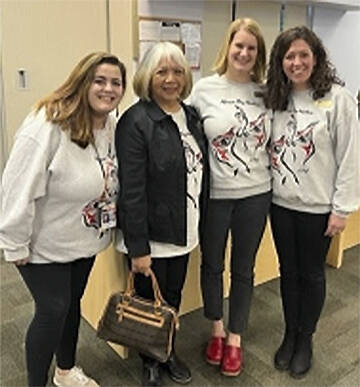Most people on Bainbridge Island don’t even know about the untold story of the “Indipinos,” even though part of their history is here.
But middle school students will after the school board last week approved showing the documentary “Honor Thy Mother” as part of its core curriculum.
After the vote, a couple dozen people cheered, some even standing in approval.
Gina Corpuz, the executive producer of the movie, said her mom was one of the aboriginal children taken from their homes at age 5 and put in schools in an effort to get them to forget about their culture. The young girls wore black uniforms, lived in dorms and were raised Catholic, with little education except for some reading and writing – and domestic duties.
Some of the students escaped and left Canada. In the 1940s, 35 of the young women made their way to Bainbridge Island. Many married Filipino men who worked in the strawberry fields, and their children were called Indipino.
Women in a clip of the documentary said they faced discrimination because of their dark skin, but they weren’t accepted by Indians or Filipinos.
They were told not to: tell anyone you’re native, speak with an accent or challenge authority. They were told to be quiet, be invisible and try to blend in. They were brought up “as good little soldiers,” one woman said.
Once they became adults, they wanted to find out where they came from so they started looking for relatives in Canada.
Corpuz said by making the film they are sharing the resiliency of the people and also promoting a deeper understanding of island history.
Staffers Reanna Rapada and Christina Corpuz Peato thanked Corpuz for bringing Honor Thy Mother to the attention of the district to better educate BI students and staff. Rapada said telling these stories help people better understand generational trauma. Teaching and learning directors Amii Pratt and Kristen Haizlip were involved in picking the curriculum.
Christina Hulett, who earlier was voted the new school board president, said films like this one can help children see the past and work toward a better future. “Share our humanness,” she said.
Public comment
Many of the 14 commenters applauded the district for adopting the curriculum before they even voted.
Robin Hunt said BI stood up for Japanese Americans and fought off white supremacists, but “Our islanders of color have experienced racism for years. We had things to work on within.” She said she gets angry when she thinks about how much was kept secret. Hunt said she’s glad to see the community emphasizing inclusion. Discrimination “is still going on. What are we going to do about this?”
Debbie Thomas said she likes how the district “honors every student – their history valued.”
After watching the documentary, Christine Cook said students spoke from their hearts and minds. They learned about connection and empathy.
Others said by telling their stories, students of color have a better sense of belonging. Others said they are proud to see more openness from the district.
Steve Soltar said something he would not have said a few years ago. “I’m proud that you are my school board. And I’m not an easy sell.” He said they made the decision despite organized resistance in the community.
Trude Lisagor said students who learn this curriculum of acceptance will make “positive change in the world.”
Mike Lisagor said he talks to classes and sees tolerance and a healthy attitude. He supports the district’s improvement plan emphasizing equity, diversity and justice. He added kids need to learn to engage in dialogue to resolve personal differences.
Rabbi Dario Feiguin thanked them for their work on racial equity. “It’s a blessing for all of us.”
Deanna Martinez, who has been on school and city boards that worked on racial equity, said she’s happy about the changes she’s seen the past few years. “Let it not happen again,” is a phrase used regarding the Japanese American internment. But it also applies to many other injustices in U.S. history. “Truth in history must be taught,” Martinez said. “Let’s not repeat our mistakes.”
For more on “Honor The Mother,” go to stourwater.com/films/honor-thy-mother/
Youth survey
This year’s Healthy Youth Survey shows the community’s risk factors are with alcohol, marijuana and e-cigarettes and vaping. The survey was given to eighth, 10th and 12th graders. Results were mixed.
For eighth-graders, alcohol use decreased 8%, but is now equal to the state average; 10th graders are down 8%, but still 3% above the state average; 12-graders are the most worrisome, up slightly but still 15% above the state average.
Pot use was down in the lower two grades, but in line with the state average. Again seniors are the concern, down 6%, but still 6% above the state average. Vaping decreased at every level, but 12 graders remain above the state average.
There was some positive news. Students said they enjoy school, feel safe, have access to school activities and have an adult they can talk to at a rate higher than the state average. As for having high hopes, BI was 15% to 20% higher than the state average for all the grade levels.
Supe’s report
Superintendent Peter Bang-Knudsen said as COVID-19 keeps scaling back he’s enjoying seeing life returning more back to normal – such as hundreds of people cheering on the track and baseball teams that afternoon on a sunny day. People at school are still getting COVID but wearing a mask is optional.
Sakai Middle School principal Drew Crandall and two students there talked about the 80th anniversary of the internment of Japanese-Americans. Relatives of some of those families were guest speakers at the school and that “connection meant more” to their learning.
Bang-Knudsen talked about the robotics team that is ranked 36th, with the top 50 advancing to districts. He said spring break is coming up April 4-8. And high school graduation is June 11, and seniors picked out caps and gowns last week.



